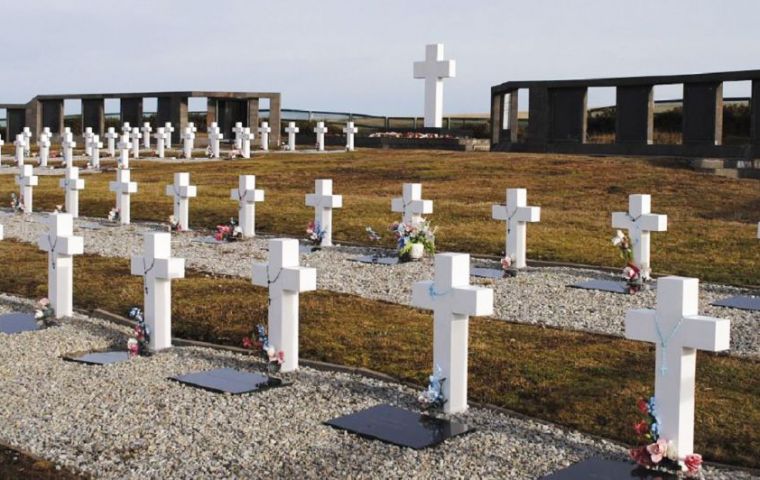MercoPress. South Atlantic News Agency
Argentina Forensic Anthropology Team nominated for the 2020 Nobel Peace Prize
 The EAAF team was involved in the identification of Argentine soldiers remains buried in the Falkland Islands
The EAAF team was involved in the identification of Argentine soldiers remains buried in the Falkland Islands The Argentine Forensic Anthropology Team, EAAF, a non-profit scientific NGO, was nominated for the 2020 Nobel Peace Prize for its investigative work into human rights violations in Latin America, Africa, Asia, and Europe.
The Latin American Council of Social Sciences, CLACSO, and the National University of Quilmes, put forward the nomination. EAAF was also involved in identifying Argentine soldiers remain buried in the Falkland Islands.
The EAAF was created in 1984 through the initiative of American anthropologist Clyde Snow, with the purpose of supporting the NGO Grandmothers of Plaza de Mayo in their investigation into cases of missing persons during the last military dictatorship in Argentina (1976-1983). In 1986 they expanded their activity beyond the country's borders and have participated in missions in over sixty countries around the world to date. The EAAF pioneered the use of forensic sciences, particularly the fields of forensic archeology and forensic anthropology, in the documentation of human rights violations.
One of EAAF’s most important international expert investigations was the mass kidnapping and disappearance of 43 Ayotzinapa Teachers College students in September 2014, in the Mexican state of Guerrero. They were specifically requested by the victims’ relatives, and the investigation garnered considerable controversy because it contradicted the official version given by the government of then President Enrique Peña Nieto. The search for the students is ongoing.
Along with the organization Justice for Our Daughters, the EAAF conducted another Mexico-based forensic investigation in order to bring justice to hundreds of women who were killed during the 1990s in Juarez, a city bordering El Paso, Texas, in the United States. In South Africa, the EAAF has collaborated with search and identification efforts on behalf of apartheid victims since 2007. In El Salvador, they unearthed thousands of victims’ bones from the 1981 Mozote massacre that was perpetrated by the Salvadoran Army which the EEAF cited in its testimony in the court.
Along with the search for the people missing from the dictatorship era, the EAAF also participated in identifying Argentine soldiers remains buried as “NN” (for “no identification”) in the Argentine Military Cemetery at Darwin, Falkland Islands, together with other forensic teams under the humanitarian plan agreed by the UK, Argentina, the Falklands government, under guidance from the International Red Cross.
Their work also spans numerous cases of femicides, human trafficking, political and ethnic crimes, and complex cases such as the 1994 attack on the Mutual Association Israelita Argentina (AMIA). In addition, they teach forensic anthropology courses in Argentina and in other countries as well.
The EAAF’s most valued fundamental principles are, above all, a respect for the wishes of the victims’ families and their communities, and an attention to scientific precision which has won them great international prestige over their 36-year history. They are known for their considerable sensitivity through every step of the process, from the initial report and investigation to the exhumation and identification of remains and resolution of the case.




Top Comments
Disclaimer & comment rulesCommenting for this story is now closed.
If you have a Facebook account, become a fan and comment on our Facebook Page!